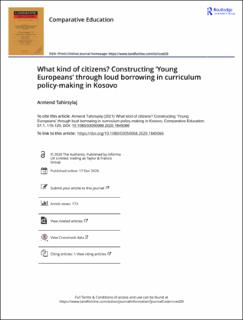What kind of citizens? Constructing ‘Young Europeans’ through loud borrowing in curriculum policy-making in Kosovo
Journal article, Peer reviewed
Published version
Permanent lenke
https://hdl.handle.net/11250/2778761Utgivelsesdato
2020Metadata
Vis full innførselSamlinger
- Institutt for lærerutdanning [3441]
- Publikasjoner fra CRIStin - NTNU [37703]
Originalversjon
https://doi.org/10.1080/03050068.2020.1845066Sammendrag
Kosovo introduced two major curriculum reforms over the past 20 years – in 2001 and 2011 – each aiming to bring education closer to international trends. Simultaneously, Kosovo underwent major political, social, and cultural changes after the war in 1999, and the declaration of independence in 2008. This article relies on document analysis and uses civic competences definitions in Kosovo and European Commission frameworks to compare conceptions of citizenship for democratic life along three theoretical constructs, namely personally responsible/individualist, participatory/social, and justice-oriented/political. It coins loud borrowing to describe the policy flow into Kosovo education, specifically focusing on the latest 2011 competence-based curriculum reform. The findings show that Kosovo’s curriculum alignment with the European Commission key competence approach in 2011 served larger political goals and aspirations to brand Kosovars as ‘Young Europeans.’ In addition, personally responsible/individualist conception and participatory/social conception of citizenship are dominant in Kosovo, as well as in European Commission frameworks.

